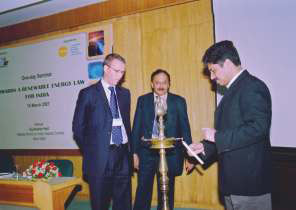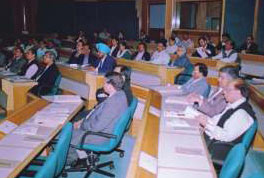ফাইলের ধরণ: PDF/Adobe Acrobat - দ্রুত দর্শন
27 Jul 2010 ... Punam Khaira Sidhu. CIT (CIB), Bengaluru. 16. Bengaluru. Best Practices / Initiatives. Sukumar Mondal. DCIT (CIB), Bengaluru ...
www.incometaxindia.gov.in/.../DeptNews_ListofContributors_07272010.pd
Tuesday 5 October 2010
Renewable law in India
The World Institute of Sustainable Energy (WISE) organised a one-day seminar on 'A Renewable Energy Law for India', at The Imperial, New Delhi, on 25 August 2005. Supported by the Ministry of Non-Conventional Energy Sources (MNES), Government of India, the seminar was organised in association with the Confederation of Indian Industry (CII)-Sohrabji Godrej Green Business Centre.
WISE sought the help of the National Law School of India University in Bangalore, particularly of CEERA, the law school's Centre for Environmental Law, Education, Research and Advocacy, to prepare the Draft Renewable Energy Law for India. It is in the process of pursuing the Draft Law to its logical conclusion viz. adoption by the Indian Parliament.
The seminar was inaugurated by Mr Vilas Muttemwar, Hon'ble Minister of State (Independent Charge) for Non-Conventional Energy Sources, Govt. of India. Other important dignitaries who graced the inauguration ceremony were, Mr A.M. Gokhale, Secretary, Ministry of Non-Conventional Energy Sources (MNES), Govt. of India; Justice Kuldip Singh, former Judge of the Supreme Court of India and Chairman, Delimitation Commission of India, New Delhi; Justice Ashok A Desai, former Chief Justice of Uttaranchal High Cour; Mr Ramesh Kymal, Managing Director, NEG-Micon (I) Pvt Ltd, and Chairman, Renewable Energy Council, CII-Godrej GBC; and Mr G M Pillai, founder Director General, WISE. Mr Muttemwar said it was imperative that an exclusive Act was put in place for the growth and development of the renewable energy sector and appreciated the initiative taken by WISE. Speaking on the occasion, Mr A M Gokhale said that there was need to downscale projects as this raised efficiency and shortened the gestation time for projects.
In his address, Justice Kuldip Singh said renewable energy needed to be promoted to meet India's rural energy needs as it was sustainable and pollution free. "The draft Renewable Energy Act needs to address all stakeholders in the power sector rather than just the government," he added. Justice Ashok A Desai, in his keynote address, opined that while developing renewable energy sources, it was necessary to evaluate and address risks. In order to propagate the use of renewable energy, it was necessary to develop the minds of the people. While addressing the distinguished gathering, Mr Ramesh Kymal called for a paradigm shift from fossil fuels to renewable energy sources, to achieve a share of 20 per cent to 25 per cent of energy from renewables, by 2030. For this, it was imperative to enact the Renewable Energy legislation in India, he opined. In his welcome address, Mr G M Pillai said that the draft Renewable Energy Law for India charted a road map for energy independence. "It had been distilled from the experiences of other countries, especially Germany, Czech Republic, and China. It goes beyond just electricity, adopting a market-based approach rather than a subsidy-based model, to encourage the growth of renewable energy in India," he said.
The outcome of the seminar was the constitution of a special working group which would work towards refining the draft law, based on the suggestions of the speakers at the seminar, other individuals and organisations. The working group will also devise a strategy for advocacy of the legislation for its subsequent adoption by the parliament.
WISE ORGANISES SECOND RENEWABLE ENERGY LAW SEMINAR |
 The draft Model 'Renewable Energy (R E) Law for India' prepared by WISE was presented for the first time at a one-day seminar held in New Delhi on 25 August 2005. The seminar was inaugurated by Vilas Muttemwar, Minister of State (Independent Charge) of Non-Conventional Energy Sources and was attended by an august gathering of senior and top-level functionaries from the government and the energy sector. The outcome of the seminar was the constitution of a special Working Group to carry forward the work of advocacy of the draft law and its adoption by Parliament. Since then, the initiative has gained wide support, both at the national and international levels. WISE has declared 2007 as the 'Year of the R E Law for India' and is launching a nation-wide advocacy campaign to champion this cause.
The draft Model 'Renewable Energy (R E) Law for India' prepared by WISE was presented for the first time at a one-day seminar held in New Delhi on 25 August 2005. The seminar was inaugurated by Vilas Muttemwar, Minister of State (Independent Charge) of Non-Conventional Energy Sources and was attended by an august gathering of senior and top-level functionaries from the government and the energy sector. The outcome of the seminar was the constitution of a special Working Group to carry forward the work of advocacy of the draft law and its adoption by Parliament. Since then, the initiative has gained wide support, both at the national and international levels. WISE has declared 2007 as the 'Year of the R E Law for India' and is launching a nation-wide advocacy campaign to champion this cause.As part of this effort, a one-day seminar, 'Towards a Renewable Energy Law for India', was organised by WISE on 16 March 2007 in India Habitat Centre, New Delhi. Besides advocacy, the main objective of the seminar was to critique the model R E Law, seek some more suggestions, tie up loose ends and arrive at a suitable consensus, so as to amend the draft law appropriately before taking it to Parliament. The event was supported by the Vienna based 'Renewable Energy and Energy Efficiency Partnership' (REEEP) and their Renewable Energy and International Law (REIL). The seminar was inaugurated by V Subramanian, Secretary, Ministry of New and Renewable Energy (MNRE), Govt. of India, while the other dignitaries present at the inaugural session were Paul Curnow, Representative, REEEP/REIL, and G M Pillai, Director General, WISE.
In his inaugural address, the Secretary emphasised the need for a relevant law to govern the renewable energy sector. He added that a law for renewable energy would be an enabling legislation to supplement the efforts of other sectoral ministries. He commended WISE's efforts in preparing a draft R E Law for India. G M Pillai, in his welcome address, stressed that the model R E law was not another 'Electricity Law'. Besides addressing electricity issues, the model law aimed at integrated energy planning and mainstreaming developmental and promotional measures for sustainable energy. He added that its overall policy was 'growth without subsidy'. Mr Pillai emphasised that the R E law was the need of the hour and hoped that the Ministry would carry forward the draft law and spearhead its adoption by Parliament. Paul Curnow in his address spoke of REEEP's initiative in India on renewable energy.
Some of the topics dealt with in the seminar were, International Experience in R E Law, Salient Features of the Model RE Law and its Critique, Strategies for Advocacy of the R E Law, etc. The eminent speakers who threw light on these issues included Balawant Joshi, Managing Partner, ABPS Infrastructure Advisory, Mumbai; Punam Khaira Sidhu, Director (M & F), Punjab State Electricity Regulatory Commission; Chintan Shah, General Manager, SenergyGlobal, New Delhi; Bunker Roy, Founder, Barefoot College, Tilonia, Rajasthan; K Srinivas, Head, Climate & Energy Project, Greenpeace India, Bangalore; C V Madhukar, Director, PRS Legislative Research, CPR, New Delhi, etc.

The Guest of Honour at the valedictory function was Akansha Chaurey, Associate Director, TERI, & Representative of REEEP South Asia Secretariat. In her concluding address, Ms Chaurey commended WISE's initiative in drafting the RE Law for India. She added that India was fortunate to have strong advocacy groups such as WISE, Barefoot college, TERI, etc., for taking on the mantle of promoting renewable energy in the country.
Renewables: CDM in the power sector
A presentation for National Workshop on "CDM in the Power Sector" on. 6th October, 2006, at Hotel Claridges , New Delhi . By. Punam Khaira Sidhu,IRS ...
www.cdmindia.com/.../Experience%20with%20CDM%20revenue%20sharing-other%20regulatory%20issues%20_229.pdf
punamsidhu: March 2007
Bangalore gets Everyone
Labels:
bangalore,
koramangala,
sarjapur,
ub city,
ulsoor,
vijay mallya
Subscribe to:
Posts (Atom)

